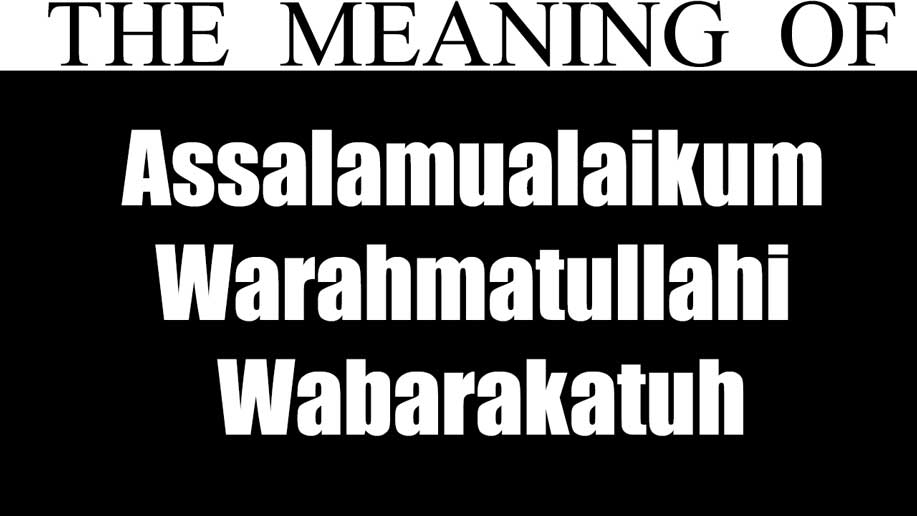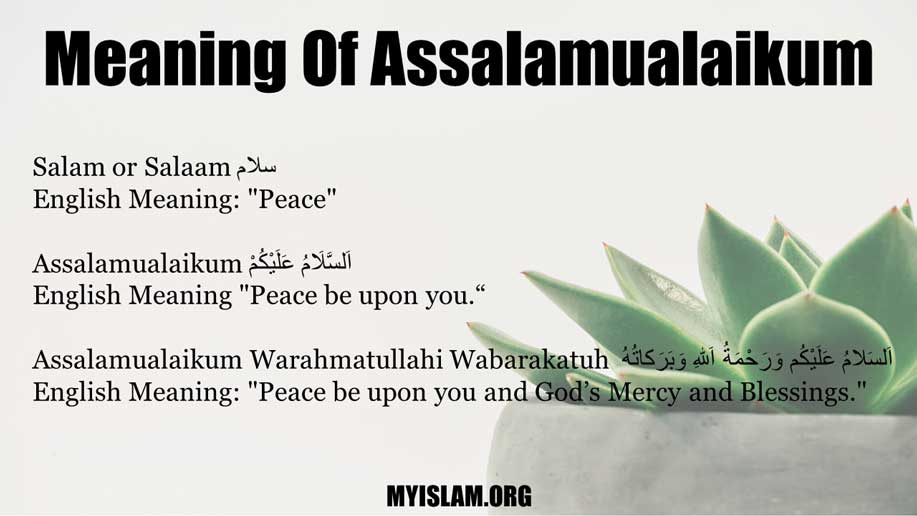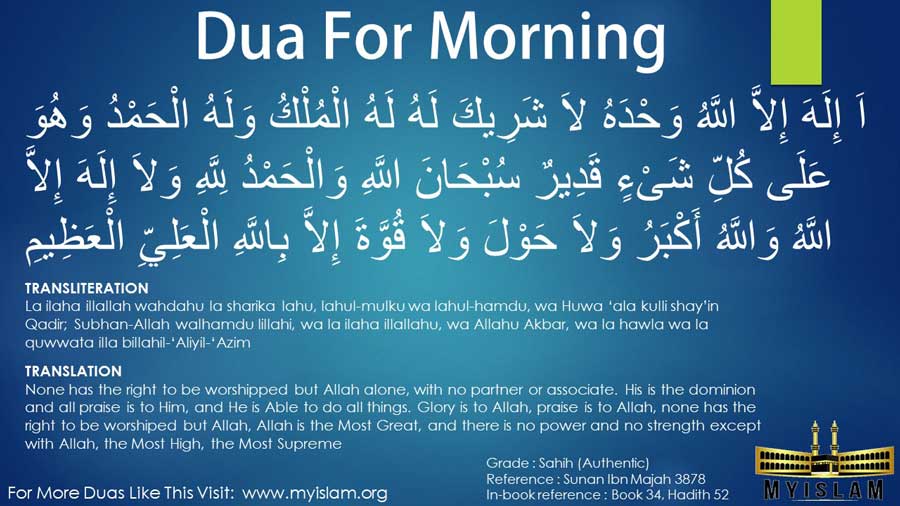
You can technically stop here, that’s all you need to remember.
But for those who are more intellectually curious and want to gain an in-depth understanding here’s what the focus of this article will be:
- Precise Meaning of Assalamualaikum Warahmatullahi Wabarakatuh
- Reply With Waalaikumsalam Warahmatullahi Wabarakatuh
- Proper Pronunciation
- Hadith and Benefits of Saying Salam According to the Prophet (saws)
- Powerful Video by Mufti Menk Explaining the Beauty of Greeting Each Other
- Can we say Salaam to non muslim?
Every sect has their own customary way of greeting each other. Jewish people say shalom, meaning peace, and Arab speaking countries say Salam, also meaning peace.
Now, you may have been under the assumption that language and speech tends to favor words getting shorter and shorter. People like shortcuts in order to save time and precious calories, so the phrase ‘what do you think’ naturally shrinks to become whadaya think, ‘I do not know’ becomes I dunno, and ‘I’m going to find it’ (5 syllables long) becomes I’m-a find it (3 syllables short).
We Muslims regularly violate this ‘universal law’ and if you’ve been around you’ve likely heard the Islamic greeting Salam (2 syllables) transform to Assalamualaikum (7 syllables). But we aren’t finished, we can add more to this by extending it to Assalamualaikum Rahmatullah (11 syllables). If you really filled your air sacs with oxygen you may even say Assalamualaikum Warahmatullahi Wabarakatuh (too many syllables to count).
Meaning Of Assalamualaikum
Let’s begin with the most basic:
Salam or Salaam (in Arabic: سلام)
English Meaning: “Peace”
Assalamualaikum (in Arabic: اَلسَّلَامُ عَلَيْكُمْ)
English Meaning “Peace be upon you.”
Assalamualaikum Warahmatullahi Wabarakatuh (in Arabic: اَلسَلامُ عَلَيْكُم وَرَحْمَةُ اَللهِ وَبَرَكاتُهُ)
English Meaning: “Peace be upon you and God’s mercy and blessings.”
Fun Fact
As-Salam is also one of Allah’s 99 names. The meaning of As-Salam is “The Giver of Peace”. The One who is free from every imperfection. He is source of peace and security for mankind.
“Whenever they kindle a fire of war, Allah extinguishes it; and they strive to create disorder in the earth, and Allah loves not those who create disorder.” (Quran Surah Al-Ma’idah 5:65)
As-Salamu ‘Alaikum (may you be safe from evil). Messenger of Allah (ﷺ) responded to his greeting and the man sat down. The Prophet (ﷺ) said, “Ten (meaning the man had earned the merit of ten good acts).”
Another one came and said: “As-Salamu ‘Alaikum wa Rahmatullah (may you be safe from evil, and Mercy of Allah be upon you).” Messenger of Allah (ﷺ) responded to his greeting and the man sat down. Messenger of Allah (ﷺ) said, “Twenty.”
A third one came and said: “As-Salamu ‘Alaikum wa Rahmatullahi wa Barakatuhu (may you be safe from evil, and the Mercy of Allah and His Blessings be upon you).” Messenger of Allah (ﷺ) responded to his greeting and the man sat down. Messenger of Allah (ﷺ) said, “Thirty.”
Such a simple act which takes 2 seconds more can give you a return of 200% greater than just simply reciting Salam. Imagine
Reply With Waalaikumsalam Warahmatullahi Wabarakatuh
An acceptable response to someone who says Assalamualaikum is wa alaikum assalam (in Arabic وعليكم السلام). Although not incorrect, it’s not complete. In the Quran it says, “And when you are greeted with a greeting, greet [in return] with one better than it or [at least] return it [in a like manner] Indeed, Allah is ever, over all things, an Accountant.”
And so a superior response would be waalaikumsalam warahmatullahi wabarakatu. According to another hadith:
Aishah (May Allah be pleased with her) reported: Messenger of Allah (ﷺ) said to me, “This is Jibril (Gabriel) who is conveying you greetings of peace.” I responded: “Wa ‘Alaihis-Salamu wa Rahmatullahi wa Barakatuhu” 2
We can follow in the footsteps of Prophet Muhammad (pbuh) by doing the same.
Waalaikumsalam Meaning
The translation of Waalaikumsalam is “and upon you, peace”. The longer, waalaikumsalam warahmatullahi wabarakatuh would translate to “May Peace, Mercy and Blessings of Allah be Upon You Also” and is a more appropriate response to someone who wishes Salam.
As a rule of thumb, when entering or leaving a place like a masjid you would want to begin with peace and leave with peace. This sentiment is mentioned in the hadith:
Abu Hurairah said “When one of you joins a gathering, let him say ‘Peace’. When he wants to get up and leave, let him say ‘Peace’. The former is not more important than the latter” (Hasan reported in Jami At-Tirmidhi).
Proper Pronunciation
Here’s a short video we put together on helping you properly say the Islamic greeting:
Hadith And Benefits:
Hadith On Love and Spreading Peace
Narrated from Abu Hurairah (RA) that the Messenger of Allah (ﷺ) said: By the One in Whose Hand is my soul, you will not enter Paradise until you believe, and you will not believe until you love one another. Shall I not tell you of something which, if you do it, you will love one another? Spread (the greeting of) peace among yourselves. Grade : Sahih (Darussalam) 2
Hadith On Youth Respecting The Elders
Narrated Abu Huraira: Allah’s Messenger (ﷺ) said, “The younger person should greet the older one, and the walking person should greet the sitting one, and the small number of persons should greet the large number of persons.” 3
Superiority Of One Who Initiates Salaam
Narrated Abu Umamah: “They said: ‘O Messenger of Allah! When two men meet, which of them initiates the Salam?’ He said: ‘The nearest of them to Allah.” 4
The Six Things Due From A Believer
Narrated Abu Hurairah: that the Messenger of Allah (ﷺ) said: “There are six things due from the believer to another believer: Visiting him when he is ill, attending (his funeral) to him when he dies, accepting his invitation when he invites, giving him Salam when he meets him, replying to him when he sneezes, and wishing him well when he is absent and when he is present.” 5
Entering Paradise
‘O people! Spread (the greeting of) Salam, feed others, uphold the ties of kinship, and pray during the night when people are sleeping, and you will enter Paradise with Salam.” 6
A Lesson From Mufti Menk on Saying Salaam
Transcription of the video:
Believe me as an ummah we are bleeding.
Bleeding in what way?
We are lacking in character and conduct.
That is one thing that people are really lacking as muslimeen.
We begin to attack one another.
To hate one another.
To address one another rudely.
To speak to one another without any respect and even worse to not even acknowledge one another.
Wallahi let me tell you something
When you look at the person physically, there is no substitute for that.
Not at all.
Never ever.
Physically it’s a gift of Allah.
This is why the hadith said, let that moment be a moment where you touched the life of the person that you’ve been blessed with or you’ve been afford ed the opportunity to actually interact with. To actually physically see them.
Touch them quickly by saying what?
Assalamualaikum rahmatullah with a smile ?
That’s an act of worship
So I greet you, it’s a an act of worship.
I smile at you looking in your eyes. Wallahi the warmth I feel it.
You will definitely feel it, you can feel the genuineness
There’s a connection that will never be substituted
Facebook, twitter cannot overtake that
This physical greeting is something else. It’s something amazing.
It is a gift of Allah
There spirituality in all of us. We feel that link, human being we are together.
Look at the person. Greet them.
That’s how you touch them primarily as a mulsim.
And guess what Allah says, If I look at you and greeted you “assalamualaikum warahmatullah” and I just looked at you. You would have to say walaikum assalam rahmatullahi as a bare minimum.
May peace be upon you and the mercy of Allah.
And you may want to add wabarakatuh “and his blessings”
And you may want to add that as Allah says in the Quran.
Wa-itha huyyeetum bitahiyyatinfahayyoo bi-ahsana minha aw ruddooha inna Allaha kana AAala kulli shay-in haseeba
Amazing end of the verse
Respond it with something better or atleast it’s equivalent.
Look at how Allah says to respond with something better, that’s to start with.
Respond with something better to start with.
fahayyoo bi-ahsana minha
Greet back with better than it.
Why?
Because someone touched your life. Go out and touch theirs in an even better way.
Amazing.
I may never get the chance to greet you again.
I may never get than chance to see you again.
But at least when I saw you once I greeted you. And guess what you greeted me back in an even better way.
Someone does good to you, do good back to them and even better way
Brilliant.
Do not wait for someone to do good to you. But do good to people you interact with. And others whom you can do good to. As best as you can.
I tell you why.
Your life in this world is limited.
You need to pack away as many as good deeds possible in order to get to the otherside one day and see a large number of good deeds.
Through what?
Worshipping alone we agree.
To do the blessed teachings of Muhammad (saws)
And part of it is through touching the lives of others.
Interacting with them with best character and conduct.
This is why Muhammad (saws) says [Arabic]
The best from amongst you are those who have brilliant character. The best in character. Amazing.
References:
- Riyad As Salihan Arabic/English book reference : Book 6, Hadith 852 [Al-Bukhari and Muslim].
- Reference : Sunan Ibn Majah 3692 In-book reference : Book 33, Hadith 36 English translation : Vol. 5, Book 33, Hadith 3692
- Reference : Sahih al-Bukhari 6234 In-book reference : Book 79, Hadith 8 USC-MSA web (English) reference : Vol. 8, Book 74, Hadith 252 (deprecated numbering scheme)
- Grade : Sahih (Darussalam) Reference : Jami` at-Tirmidhi 2694 In-book reference : Book 42, Hadith 7 English translation : Vol. 5, Book 40, Hadith 2694
- Grade : Hasan (Darussalam) English reference : Jami` at-Tirmidhi Vol. 5, Book 41, Hadith 2737 Arabic reference : Book 43, Hadith 2956
- Grade : Sahih (Darussalam) English reference : Sunan Ibn Majah Vol. 4, Book 29, Hadith 3251 Arabic reference : Book 29, Hadith 3374






First, forgive my ignorance. I am not Muslim and wish not to offend. I have a work-related question, and I found that it is best to ask experts when you are in doubt. I am an administrator of my companies Telegram channel. We have a user that says a greeting which has been pointed out to me to be offensive. I do not know whether it is offensive, and I do not want to censor him unnecessarily. I will however gladly do so on your guidance. I will preface this because on the face of it he is trying to give a blessing or a nice thought to people. I assume he has good intentions and may be illiterate, use a language people do not know, or is dyslexic or can’t spell. I don’t know why people are wrong, i just know some were angered by his repeated actions. Unfortunately, I have to type what he said. If I am wrong by doing so, please forgive me. I have to ask this because I am trying to help ‘your’ community. Now here is the offensive saying that he types. “Assalamaleku ” interestingly it also came up as “Assal Maleku” in spell check here, which is also different than I have seen it. What do I do? Erase this if it is offensive,